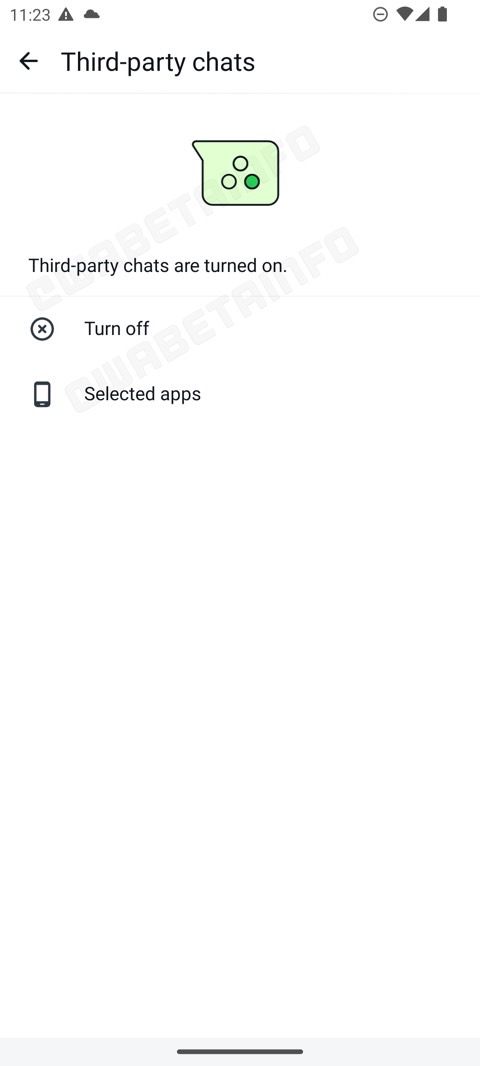Today is March 7, the big deadline for the Digital Markets Act (DMA). The law went into effect on Thursday, so all major tech companies operating concierge services must have updates to comply with the requirements. For Apple, it’s sideloading iPhone support via iOS 17.4. For Meta, this means WhatsApp and Facebook Messenger interoperability (interop, as Meta calls it) chats.
What about users? I am a European who will be able to take advantage of all these DMA benefits. I already know I don’t want to sideload on iPhone (or Android, for that matter). But interoperability seems like DMA’s dumbest requirement, a feature I don’t want to exploit in WhatsApp or any competing instant messaging app that might be labeled a gatekeeper.
Meta’s explanation of how WhatsApp interop will work is also the best explanation for the unnecessary interoperability requirement. Why go through all this trouble to fix something that wasn’t broken in the first place?
What is interoperability?
In a detailed blog post, Meta explained all the work behind aligning WhatsApp and Facebook Messenger with competing chat apps seeking support.
Interop depends on it. First, a WhatsApp rival must want their app to work with Meta chat platforms. Even if this is achieved, it is up to the WhatsApp/Messenger user to decide whether to enable the feature.
Meta says it wants to preserve end-to-end WhatsApp encryption once interop support arrives. It will move WhatsApp and Messenger’s Signal encryption protocol to third-party chat apps. Other alternatives can be accepted if they are at least as good as Signal.
How will it work?
Meta worked for two years to implement the changes required by the DMA. But things will not work out just like that from Thursday. A competing service must request interop support and then wait at least three months for Meta to implement it.
It may take longer than that for WhatsApp and Messenger to support the service. Rinse and repeat for each additional chat app that wants to work with WhatsApp.
That’s a lot of work, both for Meta and WhatsApp competitors. I don’t see how any of this benefits the user. The interop chat experience is not worth it to me. Here’s what you’ll get in the first year. Because yes, DMA has certain feature requirements that interop chats should offer:
Interoperability is a technical challenge – even when focused on the core functionalities required by DMA. In the first year, the requirement is for 1:1 text messaging between individual users and sharing of images, voice messages, videos and other attached files between individual end users. In the future, the requirements are extended to group functionality and calling.
Fortunately, DMA also focuses on privacy and security. That’s why WhatsApp and Messenger will focus on keeping chats end-to-end encrypted. Please note that Messenger end-to-end encryption started rolling out a few months ago and may not be available in all markets.

Meta’s blog does a great job of explaining what’s going on under the hood with interop chats between WhatsApp and third-party apps. It highlights all the tremendous work and resources that Meta puts into this.
I’m actually kind of in awe of Meta’s willingness to abide by these DMA provisions. All this effort makes me wonder what Meta stands to gain from all this interoperability. Maybe the endgame is to convert even more users to WhatsApp and Messenger, but I digress. After all, it’s not like the Meta can avoid adhering to the DMA.
I will also say that Meta does not appear to limit interoperability to the European Union, as Apple does with iPhone sideloading. Or, at least, restrictions aren’t the focus of this blog, although the title makes it clear that it’s about chats in Europe: “Making third-party messaging interoperability safe for users in Europe.”
An obvious warning
While Meta also explains how encryption and user authentication will work, it acknowledges that it is not in complete control. Therefore, it cannot promise the user the same level of security and privacy for mutual Whatsapp chats as Whatsapp-to-Whatsapp chats:
It’s important to note that the E2EE promise Meta makes to users of our messaging services requires us to control sending and receiving clients. This allows us to ensure that only the sender and the intended recipient(s) can see what is sent and that no one can listen to your conversation without both parties knowing.
Although we have built a secure interoperability solution that uses Signal Protocol encryption to protect messages in transit, without ownership of both clients (endpoints) we cannot guarantee what the third party provider does with the messages sent or received and therefore cannot make the same promise.
[…] users need to know that our security and privacy promises and feature set will not exactly match what we offer in WhatsApp chats.
If you care about WhatsApp interoperability, you should read the entire blog at this link. Then immediately disable the feature after WhatsApp notifies you that interop support is ready.